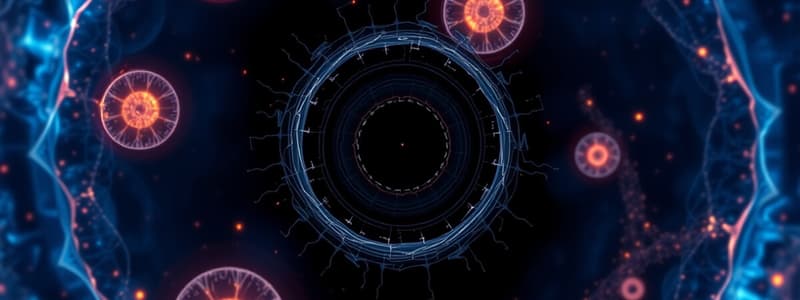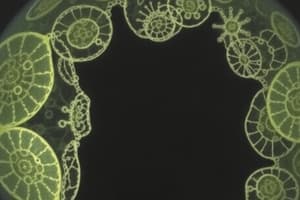Podcast
Questions and Answers
What is the primary role of the contractile ring during cytokinesis?
What is the primary role of the contractile ring during cytokinesis?
- To synthesize new DNA for daughter cells
- To redistribute organelles to daughter cells
- To facilitate the movement of chromosomes to opposite poles
- To pull the plasma membrane inward, dividing the cell (correct)
Which cellular structure is primarily responsible for determining the plane of cytoplasmic cleavage?
Which cellular structure is primarily responsible for determining the plane of cytoplasmic cleavage?
- The mitotic spindle (correct)
- The nuclear envelope
- The centrioles
- The Golgi apparatus
What type of filaments make up the contractile ring in animal cells?
What type of filaments make up the contractile ring in animal cells?
- Actin and myosin filaments (correct)
- Collagen and elastin fibers
- Only myosin filaments
- Microtubules and intermediate filaments
During which stage of the cell cycle does the cleavage furrow begin to form?
During which stage of the cell cycle does the cleavage furrow begin to form?
What happens to the nuclei formed during telophase in the context of cytokinesis?
What happens to the nuclei formed during telophase in the context of cytokinesis?
In which type of cells is the concept of the contractile ring particularly relevant?
In which type of cells is the concept of the contractile ring particularly relevant?
What is the significance of the cleavage furrow in the process of cytokinesis?
What is the significance of the cleavage furrow in the process of cytokinesis?
What is the primary function of the Cdc20-APC complex in the cell cycle?
What is the primary function of the Cdc20-APC complex in the cell cycle?
During the early stages of Drosophila embryonic development, what is the primary mechanism that drives synchronized nuclear division?
During the early stages of Drosophila embryonic development, what is the primary mechanism that drives synchronized nuclear division?
What triggers the transition from mitosis to G1 phase in the cell cycle?
What triggers the transition from mitosis to G1 phase in the cell cycle?
Which complex is active during G1 phase and maintains low levels of M-cyclin?
Which complex is active during G1 phase and maintains low levels of M-cyclin?
What role do mitogens play in relation to the cell cycle?
What role do mitogens play in relation to the cell cycle?
Why is the G1 phase absent in rapidly dividing embryonic cells during development?
Why is the G1 phase absent in rapidly dividing embryonic cells during development?
How do the functions of Cdc20-APC and Cdh1-APC differ?
How do the functions of Cdc20-APC and Cdh1-APC differ?
What triggers the rhythmic division of nuclei in the Drosophila embryo?
What triggers the rhythmic division of nuclei in the Drosophila embryo?
Why are the levels of M-cyclin low in G1 phase cells?
Why are the levels of M-cyclin low in G1 phase cells?
What role do DNA-PK, ATM, and ATR play in the context of DNA damage?
What role do DNA-PK, ATM, and ATR play in the context of DNA damage?
Which statement about p53 is accurate regarding its function in response to DNA damage?
Which statement about p53 is accurate regarding its function in response to DNA damage?
How do CKI p21 and the cyclin CDK complex interact under conditions of DNA damage?
How do CKI p21 and the cyclin CDK complex interact under conditions of DNA damage?
What triggers the activation of ATR as a response to DNA damage?
What triggers the activation of ATR as a response to DNA damage?
Which of the following best describes the physiological process linked to Myc in cell proliferation regulation?
Which of the following best describes the physiological process linked to Myc in cell proliferation regulation?
What primary function do mitogens serve in the cell cycle?
What primary function do mitogens serve in the cell cycle?
How do growth factors primarily contribute to cell growth?
How do growth factors primarily contribute to cell growth?
What is the role of survival factors in cellular processes?
What is the role of survival factors in cellular processes?
What misconception is associated with the term 'growth factor'?
What misconception is associated with the term 'growth factor'?
What is the significance of cyclin CDK complexes in the cell cycle?
What is the significance of cyclin CDK complexes in the cell cycle?
Which molecule is an example of a growth factor that also stimulates cell proliferation?
Which molecule is an example of a growth factor that also stimulates cell proliferation?
What is the main function of myosin II during cytokinesis?
What is the main function of myosin II during cytokinesis?
Which molecule is primarily responsible for regulating the activation of myosin II during cytokinesis?
Which molecule is primarily responsible for regulating the activation of myosin II during cytokinesis?
What role do sensor molecules play in the context of DNA damage?
What role do sensor molecules play in the context of DNA damage?
In what way can membrane-enclosed organelles be distributed during cytokinesis?
In what way can membrane-enclosed organelles be distributed during cytokinesis?
What effect does the degradation of CKI have in the cell cycle?
What effect does the degradation of CKI have in the cell cycle?
Which signaling cascade is activated by mitogens to promote mitosis?
Which signaling cascade is activated by mitogens to promote mitosis?
What roles do the interpolar microtubules play in cell division?
What roles do the interpolar microtubules play in cell division?
Which statement about cell growth and cell proliferation is accurate?
Which statement about cell growth and cell proliferation is accurate?
How does RhoGEF affect RhoA?
How does RhoGEF affect RhoA?
What observation can be made regarding the distribution of actin during cytokinesis?
What observation can be made regarding the distribution of actin during cytokinesis?
Which of the following best describes the effect of centrosomes on the formation of the contractile ring?
Which of the following best describes the effect of centrosomes on the formation of the contractile ring?
What is a significant outcome of mitosis occurring without cytokinesis?
What is a significant outcome of mitosis occurring without cytokinesis?
What experimental evidence supports the idea that both astral and interpolar microtubules contribute to the positioning of the cleavage furrow?
What experimental evidence supports the idea that both astral and interpolar microtubules contribute to the positioning of the cleavage furrow?
Flashcards are hidden until you start studying
Study Notes
Cytokinesis Overview
- Cytokinesis completes the cell cycle and occurs after M phase.
- The cleavage plane during cytokinesis is guided by the mitotic spindle.
- In animal cells, a contractile ring composed of actin and myosin filaments facilitates cell division.
- Essential organelles must be appropriately distributed to daughter cells during division.
Contractile Ring Formation
- The contractile ring forms at the cell's equator beneath the plasma membrane and plays a crucial role in cytokinesis.
- Actin and myosin, present in the ring, contribute to the ring's contraction and subsequent furrowing of the cell membrane.
- Electron microscopy reveals distinct cleavage furrows, exemplified by studies of fertilized frog eggs.
Monitoring Cell Division
- The cell cycle of eukaryotic cells, such as mouse fibroblasts, illustrates stages from interphase to cytokinesis.
- Mitosis progresses through phases including anaphase and culminates in the visible cleavage furrow formed during cytokinesis.
Actin and Myosin Role
- Fluorescent microscopy can label actin with red fluorophores and myosin with green to visualize the contractile ring.
- Myosin predominantly associates with the cleavage furrow, while actin is present at both the cleavage furrow and cell cortex.
Cytokinesis Regulation
- RhoA, a small GTPase, is crucial for regulating cytokinesis. Activated by RhoGEF, RhoA facilitates actin filament formation and myosin II activation via phosphorylation.
- This signaling cascade ensures proper contractile ring function during cytokinesis.
Mitotic Spindle and Division Plane
- The plane of animal cell division is influenced by microtubules of the mitotic spindle.
- Models of contractile ring formation include contributions from astral microtubules and interpolar microtubules that localize regulatory proteins.
Distribution of Organelles
- Membrane-enclosed organelles may be distributed symmetrically or asymmetrically during cytokinesis.
- Asymmetric distribution occurs in organisms like C. elegans, guiding differentiation during embryogenesis.
Mitosis Without Cytokinesis
- In certain instances, mitosis can happen without cytokinesis, creating multinucleated cells, as observed during Drosophila embryonic development.
Exit from Mitosis
- To exit mitosis and enter G1 phase, M-cyclin must be degraded and M-CDK inactivated through the Cdc20-APC complex, enabling proper transition and regulation of the cell cycle.
Role of Mitogens
- Mitogens stimulate cell division by relieving negative controls that inhibit cell cycle progression.
- Growth factors promote cell size increase, while survival factors prevent apoptosis.
Examples of Mitogens
- Platelet-derived growth factor (PDGF) stimulates cell growth and proliferation, indicating the multifaceted roles of certain growth factors.
Cell-cycle Regulation by Mitogens
- Mitogen signals activate cyclin/CDK complexes that regulate cell cycle progression, involving transcription factors that promote cyclin synthesis and inhibit CKI proteins.
DNA Damage Response
- DNA damage serves as a checkpoint that halts cell division, detected by specific sensor molecules that trigger a response to maintain genomic integrity.### DNA Damage Detection and Response
- Sensors identify various types of DNA damage, including replication fork alterations and double-strand breaks.
- Detection of DNA damage activates signal transduction pathways, regulating cell cycle blockers until repair is achieved.
- Major checkpoints in the cell cycle halt progression if DNA damage is sensed.
- Ineffective repair mechanisms lead to apoptosis instead of the proliferation of cells with damaged DNA.
Major Regulators of DNA Damage Response
- Key regulators include DNA-PK, ATM, and ATR; all possess kinase domains crucial for phosphorylating target proteins.
- These enzymes are central to DNA damage response, regulating repair, cell cycle control, and replication.
- ATM was discovered in 1996, highlighting ongoing research in DNA damage mechanisms.
Pathways Related to DNA Damage
- Different pathways are activated for double-strand (DSB) and single-strand (ssDNA) DNA damage.
- Specific sensors detect and activate distinct pathways leading to cellular responses.
- Effectors like p53 play critical roles in coordinating these cellular responses.
Role of p53 in DNA Damage Response
- p53 is a major regulator of DNA damage response, inhibiting cell cycle progression and activating DNA repair mechanisms.
- Mutations in p53 can prevent effective DNA damage protection, leading to tumor formation.
- p53 activates proteins involved in DNA repair and regulatory checkpoints, blocking cyclin CDK complexes through p21 activation.
Cell Cycle Arrest Mechanisms
- DNA damage causes cell cycle arrest in G1 phase through phosphorylation of p53, resulting in CKI p21 synthesis.
- CKI p21 inhibits cyclin CDK complexes, preventing their activation and halting the cell cycle.
- Various factors, including UV rays and radiation, can induce DNA damage.
Tumor Suppressors and Oncogenes
- Myc, a transcription factor, influences cell proliferation and is regulated to prevent excessive growth.
- Arf acts as a tumor suppressor, countering excessive Myc levels by activating p53.
- Activating mutations in oncogenes like Ras and Myc lead to unregulated proliferation if protective mechanisms fail.
Coordination of Cell Proliferation and Growth
- Cell growth accompanies proliferation; without it, daughter cells would decrease in size after each division.
- Growth factors stimulate both growth and division by enhancing ribosome and protein production and expanding the cell membrane.
- Distinction among factors: some promote growth, some promote division, and others do both.
Conclusion
- Understanding the complex pathways involved in DNA damage response and cell cycle control reveals mechanisms critical to preventing abnormal cell proliferation and tumorigenesis.
Studying That Suits You
Use AI to generate personalized quizzes and flashcards to suit your learning preferences.




